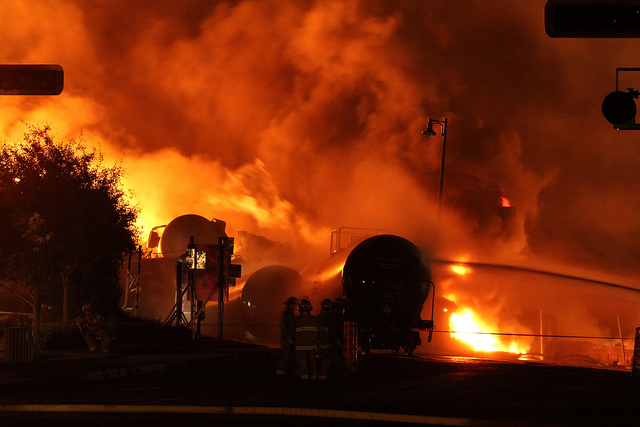The trial of the three frontline workers charged with criminal negligence causing death in the Lac-Mégantic oil train disaster has now begun in a Sherbrooke, Québec, courtroom. If found guilty, they could face life in prison, for the deaths of 47 people.
The now defunct owner of the railway that passes through the town — Montreal, Maine and Atlantic Railway (MMA) — faces the same charges, but its trial will be held at a later date. What are the consequences of an extinct corporate shell being found guilty, but minus charges against its executives and owner: none.
Many people in Lac-Mégantic believe that the right people are not on trial. I agree with them. The Crown’s case will exclusively target the men closest to the disaster: those at the bottom of the pyramid of accountability. But individuals at higher levels of the pyramid have escaped accountability. They have not been blamed for their role in the disaster. Who are they?
Senior executives and directors of the delinquent company MMA, especially the owner Ed Burkhardt; no significant decisions were made without his permission: not held to account.
Transport Canada senior officials and the minister, who allowed this delinquent company to continue operating without any sanctions; allowed it to cut corners and play Russian roulette with public safety; whose highly defective oversight system failed catastrophically: not held to account.
Conservative government leaders who exhibited complacency and casual indifference to the dangers of the mammoth surge in the transportation of volatile oil by rail: not held to account.
Industry lobbyists who pressured senior officials and politicians not to implement additional regulations to deal with this new and dangerous phenomenon: not held to account.
The senior Transport Canada official(s) who made the decision [with the tacit support of superiors] — over major opposition within Transport Canada itself and the unions — to allow MMA to operate its 12,000-ton high hazard oil trains through cities and towns piloted by a single-person crew: not held to account.
The industry lobby, the Railway Association of Canada [RAC], which led the controversial redrafting of the Canadian rail operating rules, with Transport Canada’s complicity, creating a loophole that allowed companies to operate single-person crew trains with virtually no conditions to ensure an equivalent level of safety; and which then lobbied aggressively on behalf of this blatantly negligent company to be the first in Canada to run massive oil trains with a single person crew: not held to account.
Conservative government leaders who were responsible for a dysfunctional culture within Transport Canada, and in the name of austerity starved its resources — including reducing the rail safety directorate’s budget by 20 per cent during the years when oil by rail was increasing exponentially — impeding its capacity to cope with this emergent reality: not held to account.
A regulation-averse prime minister responsible for instituting a notorious one-for-one rule policy requiring agencies which proposed a new regulation, to eliminate at least one existing regulation regardless of its impact on safety, on the pretext that cutting “red tape” would unleash market forces of job creation and economic growth; a policy which likely stonewalled the implementation of regulations that might have mitigated the risks of this new threat: not held to account.
Deregulation by both Conservative and Liberal governments, which systematically weakened or eliminated regulations, replacing them with voluntary codes and industry self-regulation [euphemistically called co-regulation] with limited or no direct oversight by governments.
A rail safety regime that continues to rely on human infallibility and the discredited myth of corporate self-regulation, and expecting another result is, to paraphrase Einstein, the definition of insanity. Lac-Mégantic was collateral damage of decades of deregulation. And yet only those at the bottom of the responsibility pyramid have been blamed. None of those on its upper levels have admitted their role or been held to account. Until this happens the lessons of Lac-Mégantic will not have been learned; and justice for the citizens of Lac-Mégantic will be denied.
Bruce Campbell is former executive director of the Canadian Centre for Policy Alternatives. In 2015, he was awarded a Law Foundation of Ontario Fellowship for his work on the Lac-Mégantic disaster; and spent 2016 at the University of Ottawa law faculty. He is currently writing a book on this tragedy. This article was first published in The Ottawa Citizen



